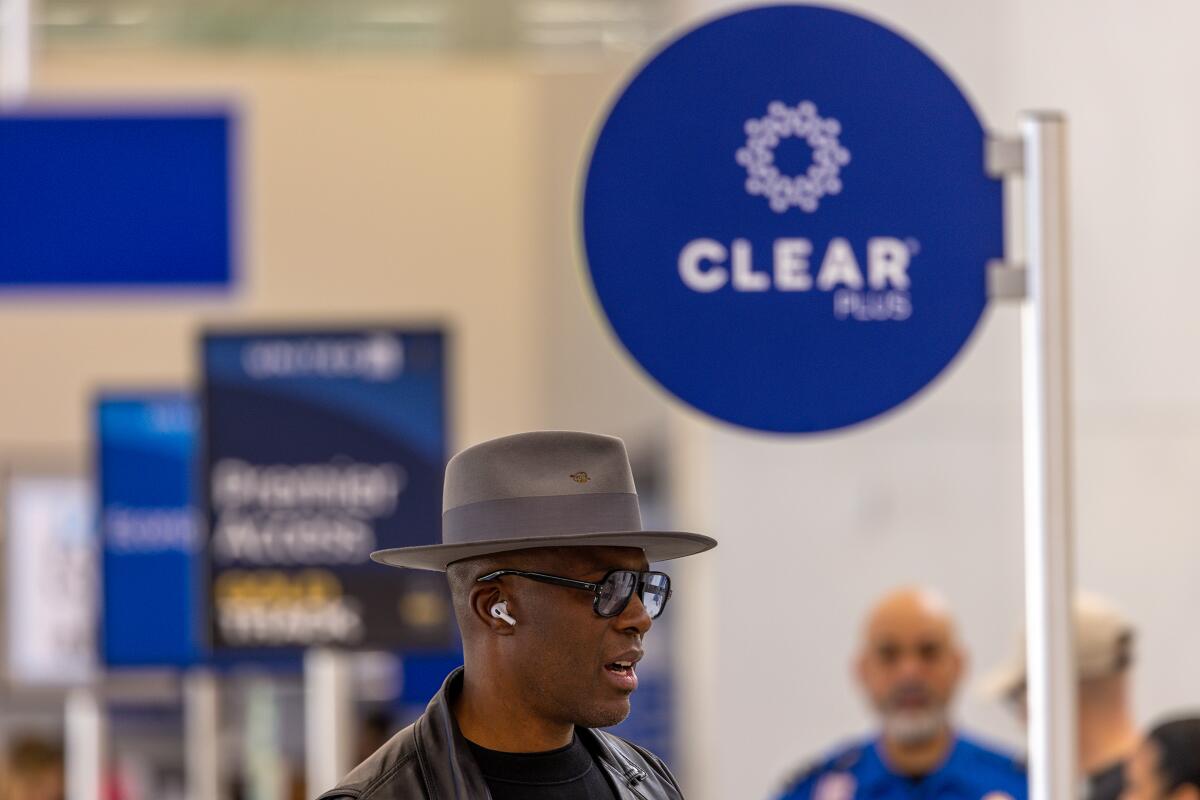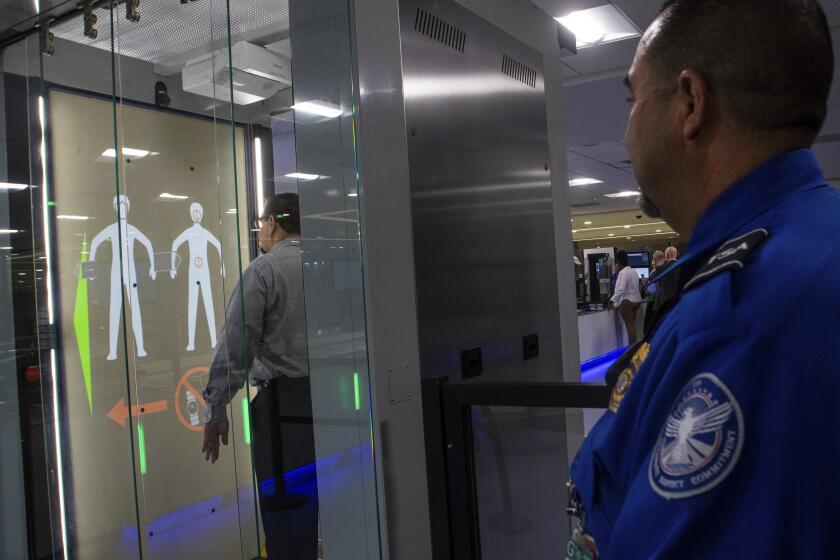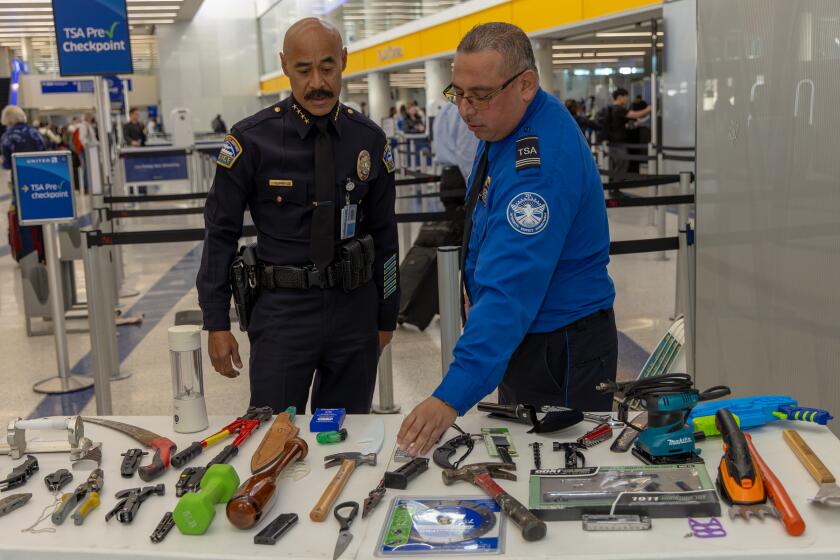Tired of Clear travelers cutting the airport security line? A California lawmaker wants change

Tired of watching Clear customers get escorted to the front of the airport security line?
California state Sen. Josh Newman sure is.
Newman (D-Fullerton), who frequently travels between his Orange County district and Sacramento, said Clear’s system of charging a premium for special access to a taxpayer-funded service has become a regular source of outrage.
“Over time, you get kind of aware of the degree to which the Clear service has kind of an adverse effect on the people who don’t use it,” Newman said, noting that he’s among that group. “There’s something very elitist, almost un-American, about it to me.”
So Newman authored a bill that would require third-party security vendors like Clear that strike deals with airports after Jan. 1, 2025, to operate through a dedicated security lane, instead of alongside mainstream lines. Currently, Clear operates at nine of the state’s largest airports.
Newman’s team believes it is the first legislation of its kind in the nation.

The original version of the bill, SB 1372, would have required Clear to use separate, dedicated security lanes in all California airports, including the ones it’s already serving. Newman said his goal wasn’t to ban Clear, which for now appears to be the only vendor that would be affected, but to have the company to work with the federal Transportation Security Administration to “re-engineer this process to separate these two lines” in California airports.
“The people who don’t [use Clear] shouldn’t be inconvenienced or frustrated,” Newman said in an interview, calling it an issue of equity.
The Senate Transportation Committee weakened the bill Tuesday so that it would allow Clear to keep its current operations intact while implementing a moratorium on new airport deals by Clear — or potential competitors — until separate queues with the TSA can be arranged. The panel then approved the bill and sent it to the Senate Appropriations Committee.
TSA is unveiling a self-service security screening system at the Harry Reid International Airport in Las Vegas.
There is no companion bill in the state Assembly.
Clear enables its customers, who pay about $200 a year, to go to the front of TSA lines after their identity is verified. Clear customers are required to go through TSA security screening and bag checks.
It wasn’t immediately known how difficult it would be for Clear to set up separate security lanes — though the process would surely require more space, employees and buy-in from the TSA — but Newman said it’s possible, pointing to Delta Air Lines’ separate check-in area and security line at Los Angeles International Airport for its highest-paying Delta One customers.
“We are proud to partner with nine airports across California — creating hundreds of jobs, sharing more than $13 million in annual revenue with our California airport partners, and serving nearly 1 million Californians,” a Clear spokesperson wrote in a statement. “We are always working with our airline and airport partners as well as local, state, and federal governments to ensure all travelers have a safer, easier checkpoint experience.”
The spokesperson did not answer questions about Newman’s bill, but the company is listed in opposition. According to the bill’s analysis, about 10% of airport patrons are Clear customers.
Newman said he found little evidence that Clear made the the airport experience more efficient or enhanced security as promised. Instead, he noted, the company has come under increased scrutiny in Washington after multiple security breaches, including an incident in which someone used a boarding pass found in the trash, as reported by Politico last year.
A majority of the guns found were loaded, according to the TSA.
“Are they really adding value?” Newman asked. “Does that justify the inconvenience that is visited upon the people who don’t use it?”
He also called the revenue generated to state airports “incremental.”
But a Clear representative at the bill’s Tuesday hearing called the recent security issues isolated incidents resulting from human error — not an issue with it’s biometric screening process.
Most major airlines, airports and chambers of commerce near the state’s largest airports opposed the measure.
In a letter to the Senate Transportation Committee chair, major U.S. airlines said the bill “not only threatens to increase fees on air carriers but also severely restricts airports’ ability to effectively manage lines at the security checkpoint.”
“Given SB 1372’s elimination of $13 million in revenue currently paid by Clear, we are concerned that the bill’s passage could further increase air carrier operating costs in the state, potentially resulting in increased fares or decreased service options,” said the letter, which was signed by Alaska, Delta, Hawaiian, United, JetBlue and Southwest airlines. “In 2023 alone, Clear verified our frequent fliers over 5 million times in California — which means our most loyal customers find value in using Clear. We find that Clear’s operation supports overall checkpoint efficiency for all travelers by helping balance queues and by performing quick and secure identity checks across the airports where they operate.”
Two major unions, representing flight attendants and Northern California transportation security officers, have lobbied in support of the changes to Clear.
The Assn. of Flight Attendants said in a letter to Senate leaders that the bill would restore equal access to security lines and mentioned growing concerns after “continuing reports about irregularities in Clear’s verification.”
“One passenger using a ‘cut the line’ program with a false identity to board an aircraft is one too many,” the flight attendants’ letter said.
But some senators Tuesday questioned the value of addressing this issue when there’s clearly enough demand for such a service that has a limited effect on others.
“Yes it’s annoying, ... [but] it only takes a second,” said Sen. Kelly Seyarto (R-Murrieta). “That’s not a big enough inconvenience to me.”
More to Read
Sign up for Essential California
The most important California stories and recommendations in your inbox every morning.
You may occasionally receive promotional content from the Los Angeles Times.













